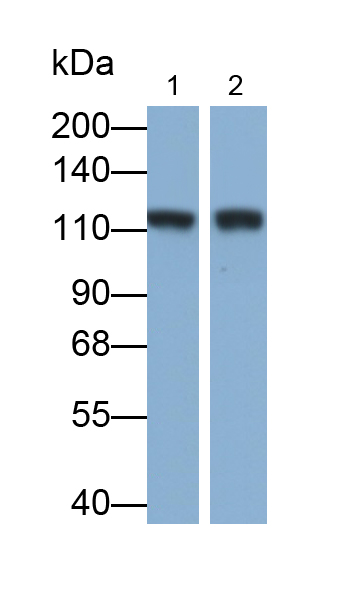Biotin-Linked Polyclonal Antibody to Cluster Of Differentiation 26 (CD26) 

CD26; ADA; DPPIV; DPP-IV; DPP4; ADABP; ADCP2; TP103; Adenosine Deaminase Complexing Protein 2; T-cell activation antigen CD26; Dipeptidyl Peptidase IV
Overview
Properties
- Product No.LAA884Hu71
- Organism SpeciesHomo sapiens (Human) Same name, Different species.
- ApplicationsWBIf the antibody is used in flow cytometry, please check FCM antibodies.
Research use only - Downloadn/a
- CategorySignal transductionEnzyme & KinaseApoptosisTumor immunityEndocrinologyCardiovascular biology
- SourceAntibody labeling
- Ig Type IgG, Potency n/a
- PurificationAntigen-specific affinity chromatography followed by Protein A affinity chromatography
- LabelBiotin
- Original Antibody PAA884Hu01-Polyclonal Antibody to Cluster Of Differentiation 26 (CD26)
- Buffer Formulation0.01M PBS, pH7.4, containing 0.05% Proclin-300, 50% glycerol.
- TraitsLiquid, Concentration 500µg/mL
Sign into your account
Share a new citation as an author
Upload your experimental result
Review

Contact us
Please fill in the blank.
Specifity
The antibody is a rabbit polyclonal antibody raised against CD26. It has been selected for its ability to recognize CD26 in immunohistochemical staining and western blotting.
Usage
Western blotting: 0.01-2µg/mL;
Optimal working dilutions must be determined by end user.
Storage
Store at 4°C for frequent use. Stored at -20°C in a manual defrost freezer for two year without detectable loss of activity. Avoid repeated freeze-thaw cycles.
Stability
The thermal stability is described by the loss rate. The loss rate was determined by accelerated thermal degradation test, that is, incubate the protein at 37°C for 48h, and no obvious degradation and precipitation were observed. The loss rate is less than 5% within the expiration date under appropriate storage condition.
Giveaways
Increment services
-
 Protein A/G Purification Column
Protein A/G Purification Column
-
 Staining Solution for Cells and Tissue
Staining Solution for Cells and Tissue
-
 Positive Control for Antibody
Positive Control for Antibody
-
 Tissue/Sections Customized Service
Tissue/Sections Customized Service
-
 Phosphorylated Antibody Customized Service
Phosphorylated Antibody Customized Service
-
 Western Blot (WB) Experiment Service
Western Blot (WB) Experiment Service
-
 Immunohistochemistry (IHC) Experiment Service
Immunohistochemistry (IHC) Experiment Service
-
 Immunocytochemistry (ICC) Experiment Service
Immunocytochemistry (ICC) Experiment Service
-
 Flow Cytometry (FCM) Experiment Service
Flow Cytometry (FCM) Experiment Service
-
 Immunoprecipitation (IP) Experiment Service
Immunoprecipitation (IP) Experiment Service
-
 Immunofluorescence (IF) Experiment Service
Immunofluorescence (IF) Experiment Service
-
 Buffer
Buffer
-
 DAB Chromogen Kit
DAB Chromogen Kit
-
 SABC Kit
SABC Kit
-
 Real Time PCR Experimental Service
Real Time PCR Experimental Service
Citations
- Linagliptin Blocks Renal Damage in Type 1 Diabetic Rats by Suppressing Advanced Glycation End Products-Receptor AxisPubmed: 24710699
- MK-0626, a dipeptidyl peptidase-4 inhibitor, improves neovascularization by increasing both the number of circulating endothelial progenitor cells and endothelial nitric oxide synthetase expression.Pubmed:24059225
- Ghrelin inhibition restores glucose homeostasis in hepatocyte nuclear factor-1alpha (MODY3) deficient micePubMed: 25979074
- Expression and Clinical Significance of Serum Dipeptidyl Peptidase IV Chronic Obstructive Pulmonary DiseasePubmed:26992252
- Expression of recombinant human α-lactalbumin in milk of transgenic cloned pigs is sufficient to enhance intestinal growth and weight gain of suckling pigletsPubmed:26899869
- Hepatic Spheroids for Long-Term Toxicity Studiesaivt.2016.0016
- High circulating plasma dipeptidyl peptidase- 4 levels in non-obese Asian Indians with type 2 diabetes correlate with fasting insulin and LDL-C levels, triceps skinfolds, total intra-abdominal adipose tissue volume and presence of diabetes: a case–control study10.1136:bmjdrc-2017-000393
- Dipeptidyl peptidase-4 levels are increased and partially related to body fat distribution in patients with familial partial lipodystrophy type 2pubmed:28450900
- The effect of CD26‐deficiency on dipeptidyl peptidase 8 and 9 expression profiles in a mouse model of Crohn's diseasePubmed:29693275
- Rapid detection of urinary soluble intercellular adhesion molecule-1 for determination of lupus nephritis activityPubmed:29953010
- The novel adamantane derivatives as potential mediators of inflammation and neural plasticity in diabetes mice with cognitive impairmentPubmed:35468904






